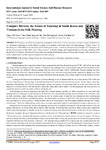Please use this identifier to cite or link to this item:
http://thuvienso.bvu.edu.vn/handle/TVDHBRVT/20792Full metadata record
| DC Field | Value | Language |
|---|---|---|
| dc.contributor.author | Tran, Thi Thuy | - |
| dc.contributor.author | Nguyen, Minh Tam | - |
| dc.contributor.author | Nguyen, Thi Thu Ha | - |
| dc.contributor.author | Le, Thi Hoai Tram | - |
| dc.date.accessioned | 2023-08-22T09:37:36Z | - |
| dc.date.available | 2023-08-22T09:37:36Z | - |
| dc.date.issued | 2023 | - |
| dc.identifier.issn | 2644-0679 | - |
| dc.identifier.issn | 2644-0695 | - |
| dc.identifier.uri | http://thuvienso.bvu.edu.vn/handle/TVDHBRVT/20792 | - |
| dc.description.abstract | Painting is one of the most important and popular forms of art. It serves not only as a means of appreciation but also as a document expressing of a local culture, a country, or a continent. This study selects two folk paintings: "Village School" by Kim Hong Do (1745-1806?) from the Danwon Folk Painting Collection - a Korean national treasure (number 527) dating back to the late Joseon period (1700~1850); and " Village School" by the Hồ, Hoàng, and Nguyễn families in Vietnam, created in 1440 during the Le so Dynasty. The objective is to explore the teaching and learning cultures of Korea and Vietnam, with a specific focus on the cultural aspects of Han character education in both countries. | vi |
| dc.language.iso | en | vi |
| dc.publisher | International Journal of Social Science And Human Research | vi |
| dc.relation.ispartofseries | International Journal of Social Science And Human Research, Volume 06 Issue 08 August 2023;pp. 4870-4877 | - |
| dc.subject | Folk Painting -- Teaching | vi |
| dc.title | Compare Between the Scenes of Teaching in South Korea and Vietnam in the Folk Painting | vi |
| dc.type | Article | vi |
| Appears in Collections: | Ngoại ngữ - Khoa học xã hội (Articles) | |
Files in This Item:
| File | Description | Size | Format | |
|---|---|---|---|---|
| Tran-Thi-Thuy.pdf | 708,57 kB | Adobe PDF |  Sign in to read |
Items in DSpace are protected by copyright, with all rights reserved, unless otherwise indicated.